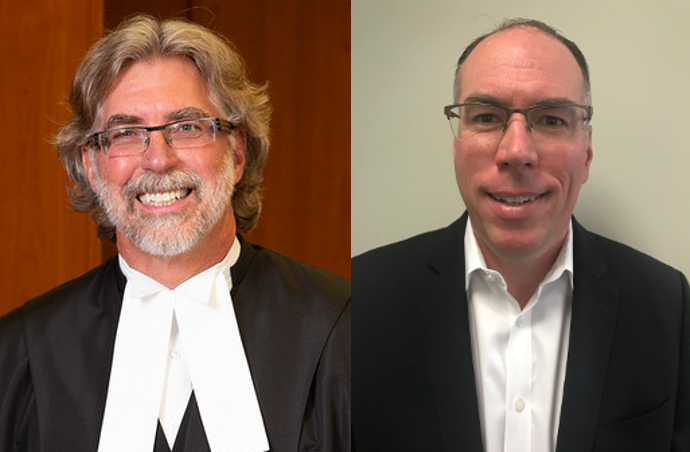
Two alumni of the University of Alberta Faculty of Law are the joint recipients of its Pringle/Royal Sessional Teaching Excellence Award for 2019.
The Hon. Kevin P. Feehan is a judge of the Court of Appeal of Alberta, and Tom Rothwell is the director of the Constitutional and Aboriginal Law Team with Alberta Justice and Solicitor General.
Feehan,'78 LLB, and Rothwell, '97 LLB, co-teach the course in Constitutional Litigation to upper-year law students. (When co-instructors of a course receive evaluations by students that are similar, both instructors are nominated together for the award.)
This year's selection committee was impressed by the duo's innovative balance of constitutional issues in civil litigation, criminal law and Aboriginal matters; the range and amount of work they dedicated to an intervenor assignment and moot; and their strategic use of guest lecturers.
"Our range of experiences allow us to present a variety of perspectives which offer valuable diversity, and emphasize to the students that "textbook" concepts are critical and do arise in practice," said Feehan and Rothwell in the teaching statement they submitted to the committee.
During the course, the duo first teaches the foundational matters of constitutional litigation in four lectures, followed by two hands-on assignments.
The first task is an introductory intervenor assignment meant to build students' confidence and prepare them for a larger moot. Students select a client and draft an intervener application plus a five-page brief for this individual assignment that's based upon a recent or current matter that involves constitutional issues.
For the second, larger assignment, students conduct a moot at the trial level, working in teams to draft a trial brief and a book of authorities. They work with evidence books that, depending upon the specific matter, include affidavits expert reports, transcripts of direct and cross-examination testimony and filed records. Feehan and Rothwell prepare these and obtain them from counsel who worked on the matters.
Every two or three years, the instructors select new moot topics, striving to include timely, intriguing issues.They also select and invite judges who have relevant expertise and experience to participate in the moot.
"We want to ensure that the students experience a 'hot bench,' said Rothwell. "That means the "court" is familiar with the case, aware of the legal issues and ready to question and test counsel on the positions that they are advancing. The students are given the opportunity to think on their feet and engage in a dialogue with the bench."
In addition to this element of the course, Feehan and Rothwell include guest lecturers in the many areas upon which constitutional law touches. For example, Judge Shelagh Creagh from the Provincial Court of Alberta discusses litigating constitutional law issues in the Provincial Court of Alberta and Eamon O'Keeffe from Liberty Law is invited to speak about s.8 (unreasonable search and seizure) from the perspective of a defence lawyer.
To ingeniously encourage class participation, the instructors conduct an online Jeopardy-style Charter game which involves two rounds of an electronic game that tests knowledge of constitutional and Aboriginal Law in a fun and interactive manner. The students participate in teams which also facilitates them getting to know one another.
Students also analyze online video clips from Supreme Court of Canada hearings recorded by the Cable Public Affairs Channel (CPAC). This allows them to watch some of the leading advocates in Canada argue their cases before the Supreme Court of Canada and exposes them to different advocacy styles.
At the end of the course, the instructors extend an invitation to all students to meet one-on-one for 15-20 minutes to discuss their moot court performance, assess their strengths and identify areas that can be improved.
Feehan was appointed a judge of the Court of Appeal of Alberta in 2018, as well as a judge of the Court of Appeal for the Northwest Territories and of the Court of Appeal of Nunavut. He was previously a judge of the Court of Queen's Bench since 2016. He has been a member of the Bar of Alberta since 1979 and the Bar of the Northwest Territories since 2007. Before joining the bench, he was a partner with Fraser Milner Casgrain LLP, now Dentons Canada LLP.
In 1998-99, Rothwell clerked for the Hon. John C. Major, justice of the Supreme Court of Canada. He worked in private practice and is currently the director of the Constitutional and Aboriginal Law Team with Alberta Justice and Solicitor General. He has sat on the boards of the Edmonton Police Foundation and the Alberta Law Foundation and is currently on the board of the Centre for Constitutional Studies at UAlberta.
The Pringle/Royal Sessional Teaching Excellence Award is named in honour of Peter Royal, QC, '74 LLB and the late Alex Pringle, QC, each of whom were long-time sessionals at the Faculty. The award is the highest honour that the Faculty bestows on sessional instructors.
The official ceremony celebrating the Pringle/Royal Sessional Teaching Excellence Award recipients will be September 25 at 5 p.m. in CN Hall.